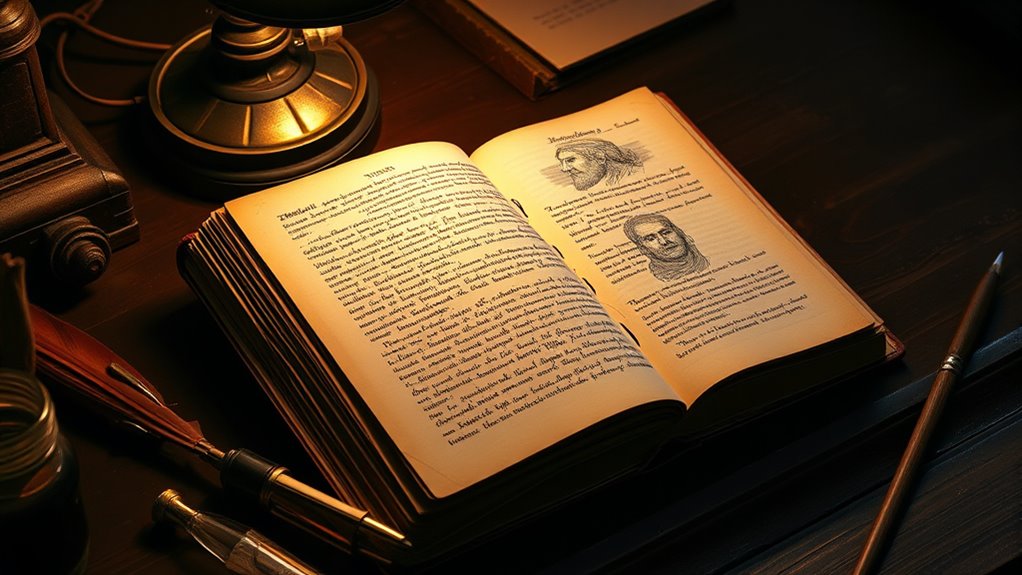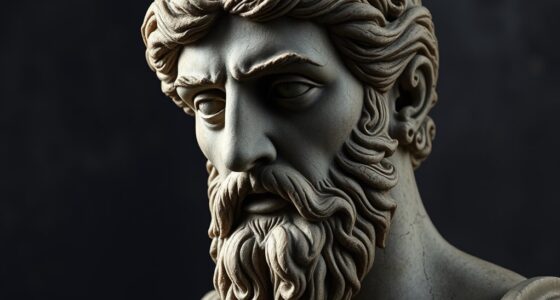You face timeless challenges to certainty, like skepticism about sensory reliability, the problem of induction, and Cartesian doubts about indubitable knowledge. Philosophers from ancient times questioned whether any belief can be truly secure, especially when perceptions can deceive or evidence is incomplete. These ten arguments keep stumping thinkers even today, revealing deep questions about what we can truly know. Keep exploring, and you’ll uncover how these ancient doubts still shape your understanding of truth.
Key Takeaways
- Skepticism questions the possibility of achieving absolute certainty in knowledge or belief systems.
- Fallibility of human perception undermines trust in sensory-based knowledge claims.
- The problem of induction reveals that past patterns may not reliably predict future events.
- Cartesian skepticism, exemplified by the “malicious demon,” doubts the certainty of all external and internal beliefs.
- Persistent epistemic doubts challenge the notion of definitive knowledge, leaving many ancient arguments still debated today.

Throughout history, many thinkers have questioned whether certainty is truly attainable, challenging the idea that we can ever be completely sure of our beliefs or knowledge. This skepticism often arises from epistemic doubt—the recognition that our reasons for believing something might be flawed or incomplete. Such doubt feeds into skeptical challenges that threaten to undermine even our most basic convictions. You might think that everyday experiences or scientific methods provide firm grounds for certainty, but philosophical inquiry reveals persistent doubts that no straightforward resolution can easily dispel. These skeptical challenges highlight the fragility of human knowledge, suggesting that what we take as certain may rest on shaky foundations.
The first major argument against certainty hinges on the fallibility of human perception. Our senses, which we rely on to gather information about the world, are not infallible. Optical illusions, hallucinations, and dreams demonstrate that what we perceive isn’t always an accurate reflection of reality. Because our senses can deceive us, any knowledge obtained through them becomes suspect. You may feel confident in your visual experiences, but epistemic doubt reminds you that your senses can be unreliable, making it difficult to claim absolute certainty about what you see or experience.
Another skeptical challenge involves the problem of induction. You might observe that the sun rises every morning and, hence, conclude it will rise again tomorrow. But philosophers point out that past regularities don’t guarantee future occurrences. Just because something has happened consistently doesn’t mean it will always happen that way. This logical gap leaves you uncertain about the reliability of inductive reasoning, which underpins much of scientific knowledge. It raises the question: can you ever be certain about future events based solely on past experience? Additionally, the limitations of scientific methods highlight that even empirical evidence is subject to doubt, as our measurements and interpretations can be flawed or incomplete.
Furthermore, Cartesian skepticism questions whether you can ever truly know anything at all, even your own existence or the external world. Descartes proposed that a malicious demon could be deceiving you, making all your beliefs about reality false. If such a powerful deceiver exists, then your entire system of knowledge collapses. This radical skeptical challenge emphasizes that, at best, you can doubt everything, and certainty might be an illusion.
These skeptical challenges are not just abstract worries; they cut to the core of how you understand knowledge. They force you to confront the possibility that your beliefs, no matter how justified they seem, could still be wrong. As a result, the quest for certainty becomes a constant battle against epistemic doubt—a reminder that even the most seemingly secure convictions are always open to challenge. This enduring tension keeps the philosophical debate alive, proving that the pursuit of absolute certainty remains an elusive goal.
Frequently Asked Questions
How Do These Ancient Arguments Influence Modern Scientific Skepticism?
You see, these ancient arguments shape your understanding of epistemic doubt, which challenges the certainty you seek in science. They remind you that scientific methodology involves constantly questioning assumptions and evidence. By confronting these arguments, you develop a healthy skepticism that drives rigorous testing and validation, ensuring your scientific pursuits remain open-minded yet critical. This balance helps you navigate uncertainty while aiming for reliable knowledge in an ever-evolving field.
Can These Arguments Be Applied to Contemporary Philosophical Debates?
Ever wonder if ancient doubts still hold weight today? You can definitely apply these arguments to contemporary philosophical debates, especially when tackling epistemic challenges and cultural relativism. They remind you to question what counts as certainty and to remain skeptical of absolute claims. These age-old doubts challenge your assumptions, pushing you to examine how knowledge is shaped by context and perspective, making modern debates richer and more nuanced.
Are There Any Counterarguments That Defend Certainty Against These Ancient Claims?
You might wonder if there are epistemic defenses and skepticism rebuttals that defend certainty against ancient claims. These counterarguments argue that some knowledge can be justified with strong evidence and logical coherence, challenging the notion that certainty is impossible. By emphasizing the reliability of certain methods and the limits of skepticism, you can find ways to uphold certainty, despite the longstanding doubts posed by these ancient arguments.
How Do Cultural Differences Affect the Interpretation of These Arguments?
You see, cultural relativism plays a big role in how you interpret these arguments, shaping your beliefs based on your cultural background. Your interpretative biases can lead you to view certainty differently across cultures, often questioning universal claims. This means that what seems certain in one culture might be challenged or seen as subjective in another. So, understanding these cultural influences helps you see the complexity behind arguments against certainty, making your perspective more nuanced.
What Are Some Practical Implications of Doubting Certainty in Everyday Life?
When you doubt certainty in daily life, it encourages you to approach practical decision making with more caution and reflection. Daily doubt helps you weigh options carefully, consider different perspectives, and avoid impulsive choices. This mindset fosters open-mindedness and adaptability, making you better at handling uncertainties. While it may slow you down momentarily, embracing doubt ultimately leads to more thoughtful, informed decisions that can improve your outcomes and personal growth.
Conclusion
So, even after centuries, these ancient arguments remind you that certainty isn’t always within reach. They challenge you to question what you believe and to accept that some truths may always remain elusive. Instead of seeking absolute certainty, embrace the uncertainty as part of the journey. Ultimately, exploring these ideas deepens your understanding and keeps you humble in the face of life’s many mysteries. Keep questioning, and let curiosity guide you beyond what’s certain.









